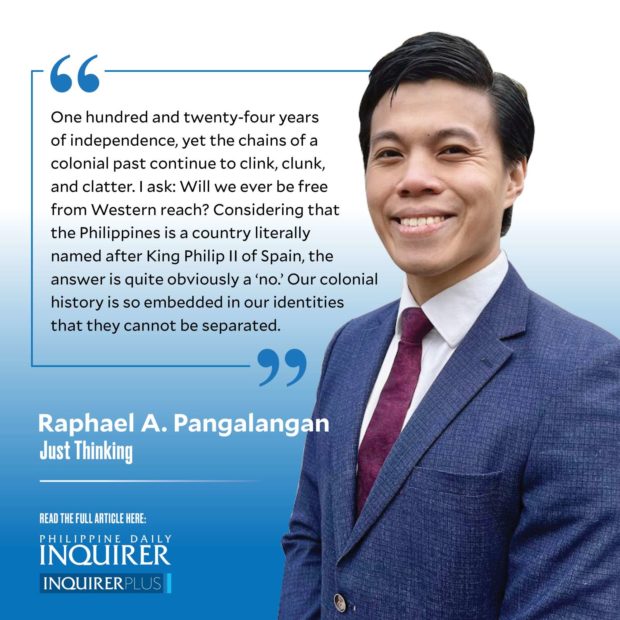Linguistic imperialism and language amnesia
President Emilio Aguinaldo may have declared independence from Spain on June 12, 1898, but the battle for Philippine sovereignty was far from won. Indeed, just six months later, behind closed doors across the seas, the Philippine islands simply changed hands from one colonial master to another.
Through the 1898 Treaty of Paris, the Philippines, together with Cuba, Puerto Rico, and Guam, were “ceded” by Spain to the United States. But considering the $20 million price tag the US had to cough up as part of its treaty obligations, perhaps the more appropriate term is “sold.”
Over that period of time, the Filipino people faced a neocolonial project. The US tried something different: They claimed that the Philippines was not their colony but a “possession.” That they were not imposing the American way. Rather, we were simply “benevolently assimilated” into it.
It was not until Proclamation 2695 of 1946 did President Harry S. Truman “recognize the independence of the Philippines as a separate and self-governing nation.” The proclamation was made on July 4—by no means a coincidence. Historic as it was ironic, for the next decade and a half, the Philippines celebrated its own day of independence to coincide with that of its own colonial overlord. (It was only when Republic Act No. 4166 was passed in 1964 that the Philippines formally began celebrating June 12 as our day of independence. We have, however, retained July 4 as “Philippine Republic Day.”)
One hundred and twenty-four years of independence, yet the chains of a colonial past continue to clink, clunk, and clatter. I ask: Will we ever be free from Western reach?
Considering that the Philippines is a country literally named after King Philip II of Spain, the answer is quite obviously a “no.” Our colonial history is so embedded in our identities that they cannot be separated. But colonial rule continues to reveal itself in more ways than eponym. It is also shown through language.
As the new colonial power, the US shifted the lingua franca from Spanish to English, and boy, did we drink that Kool-Aid! Today, the 1987 Constitution recognizes English, together with Filipino, as the Philippines’ official language.
Unfortunately, however, that linguistic relationship is unrequited. Filipinos are rated “high proficiency” on the EF English Proficiency Index, ranking 18th out of 112. Yet based on TOEFL (Test of English as a Foreign Language), IELTS (International English Language Testing System), and school policies, we are also assumed to suffer from language amnesia every two years. When I applied for grad studies at Oxford in 2017, I sat a mandatory language proficiency test. Come 2019, I decided to take up my LL.M. at Cambridge, and, to my surprise, I was required to sit a language test anew. The policy reads: “Language test scores must be less than two years old by the start of the graduate course”—a policy shared by most top-tiered US- or UK-based universities.
Imagine: They forced us (albeit “benevolently”!) to learn the English language. And now that we want to engage in discourse with them, they say we didn’t learn the language quite well enough? Susmaryosep! It’s baffling to see that these discriminatory, prohibitive, and illogical practices remain in place to this day, and in no less than in the world’s elite academic institutions.
But if there were one other legal example that best illustrates the entwinement of language and imperialism, we need not look further than the Revised Penal Code (RPC).
An anglicized version of the “Old Penal Code,” which in turn was a Filipinized iteration of Spain’s Codigo Penal, the RPC is levels-deep in legal transplantation with a hodgepodge of history packed within its pages. While crimes are defined in English, the penalties are retained in Spanish form. Today, a century and some after Philippine independence from Spain, Filipinos are still penalized with Spanish terms—destierro, arresto mayor, reclusion temporal, etc.
English crimes. Spanish penalties. Two histories codified in law. Words say a lot, don’t they? I hear the colonial chains rattle even as I type.
thinkjustly@gmail.com
MORE ‘JUST THINKING’ COLUMNS
PH failed transitional justice project (so far)





















